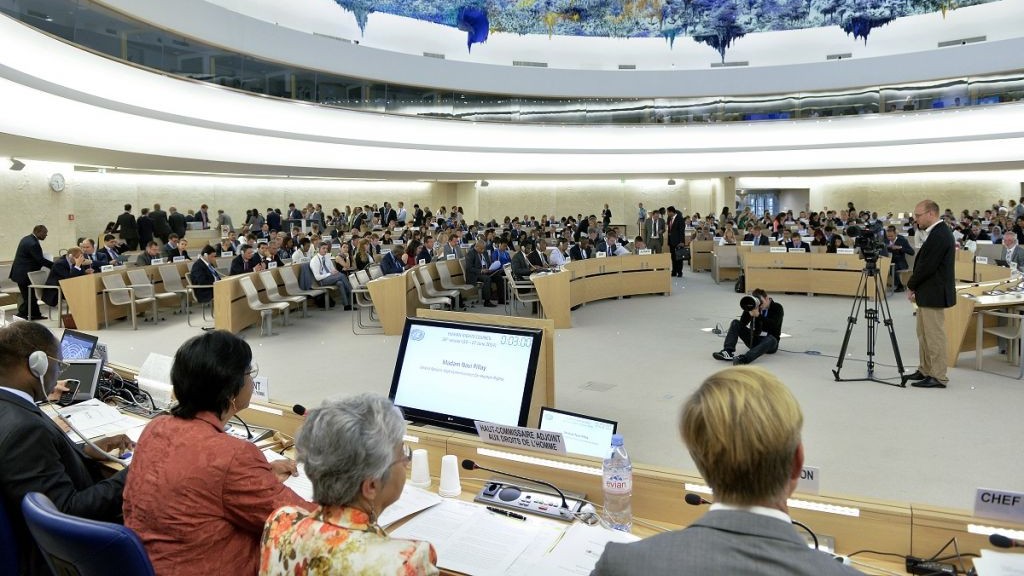Australia/Israel Review
Deconstruction Zone: Turning human rights into a bad joke
Mar 5, 2020 | Evelyn Gordon

If you want to understand just how outrageous the UN Human Rights Council’s (UNHRC) blacklist of businesses operating in Israeli “settlements”, released on Feb. 12, really is, forget for a moment about its anti-Israel bias and its warping of international law.
Instead, simply evaluate it on its own terms, as a compilation of companies engaged in “activities that raised particular human rights concerns.”
So what horrendous activities do these 112 companies engage in? Well, there are several supermarket chains, which sell groceries to both Israelis and Palestinians in the West Bank, Golan Heights and eastern Jerusalem. There are several fuel companies, which operate petrol stations where both Israelis and Palestinians fill up their cars.
There are several bus and rail companies, which provide public transportation used by Israelis and Palestinians alike. There are phone companies (mobile and landline) that provide general communications services. There are banks, which provide basic banking services. There’s a water company, which provides potable drinking water and sewage solutions.
There are also several food and clothing manufacturers, like General Mills, Angel Bakeries and Delta Galil, whose crime seems to consist of nothing but the fact that their cereals, bread and underwear can be found on supermarket shelves in the West Bank, Golan Heights and eastern Jerusalem.
In short, almost all the companies on the so-called blacklist simply provide the most fundamental human necessities – food, water, transportation, communication. Some of these are defined by the United Nations itself as inalienable rights: Article 25 of the Universal Declaration of Human Rights states that “everyone” has a right to “food, clothing, housing and medical care and necessary social services”; there’s no asterisk saying “except for settlers”. Others, like transportation and communication, aren’t considered rights, but they are considered positive goods in any other context.
In contrast, the UNHRC couldn’t find a single company engaged in “captivity of the Palestinian financial and economic markets” or “practices that disadvantage Palestinian enterprises, including through restrictions on movement, administrative and legal constraints” – something that might actually raise human rights concerns. And only three were involved in providing “surveillance and identification equipment for settlements, the wall and checkpoints directly linked with settlements,” which at least sounds sinister if you don’t realise that such equipment is merely intended to prevent terrorists from slaughtering children in their beds (see the cases of the Fogel family, Hallel Ariel and many others).
To realise how absurd this list is, try a simple thought experiment. Syrian and Russian soldiers have been slaughtering civilians in Syria on an almost daily basis for nine years now; the death toll is more than half a million and counting. But does anyone think the supermarkets that sell these soldiers food, or the water company that supplies their bases with running water, are engaged in “activities that raised particular human rights concerns”? Of course not; we believe that even the worst murderers are entitled to food, water and clothing. That’s precisely why all countries provide such basics to criminals in jail.
Human rights violations used to refer to grave crimes like murder, rape and ethnic cleansing. But now, along comes the UNHRC and says that actually, even the most essential human activities – food, water, transportation, communication – raise “particular human rights concerns.” This turns the very idea of “human rights concerns” into a bad joke – if every human activity is a “human rights concern,” then nothing is.
There has been a lot of concern among Israel and its supporters that the blacklist will lead to boycotts and sanctions on the listed companies. That’s one reason for the wall-to-wall condemnation it has elicited in Israel.
Yet precisely because most of the targeted companies are basic service providers, the economic impact will likely be small. Most of these companies neither export, nor attract much foreign investment. And since their businesses depend almost exclusively on selling or providing services to Israelis (and Palestinians), the only way to boycott them would be for the boycotters to actually move to Israel.
Rather, the real danger comes from the way this blacklist cheapens the very idea of human rights. According to the UNHRC, there is effectively no difference between mass murder and selling groceries; both raise “particular human rights concerns.” That’s a standard that no minimally moral human being could take seriously.
It turns “human rights concerns” into a laughing stock, and thereby undermines respect for all human rights.
Evelyn Gordon is a journalist and commentator living in Israel. © JNS.org, reprinted by permission, all rights reserved.
Tags: Human Rights Council, Israel, United Nations






